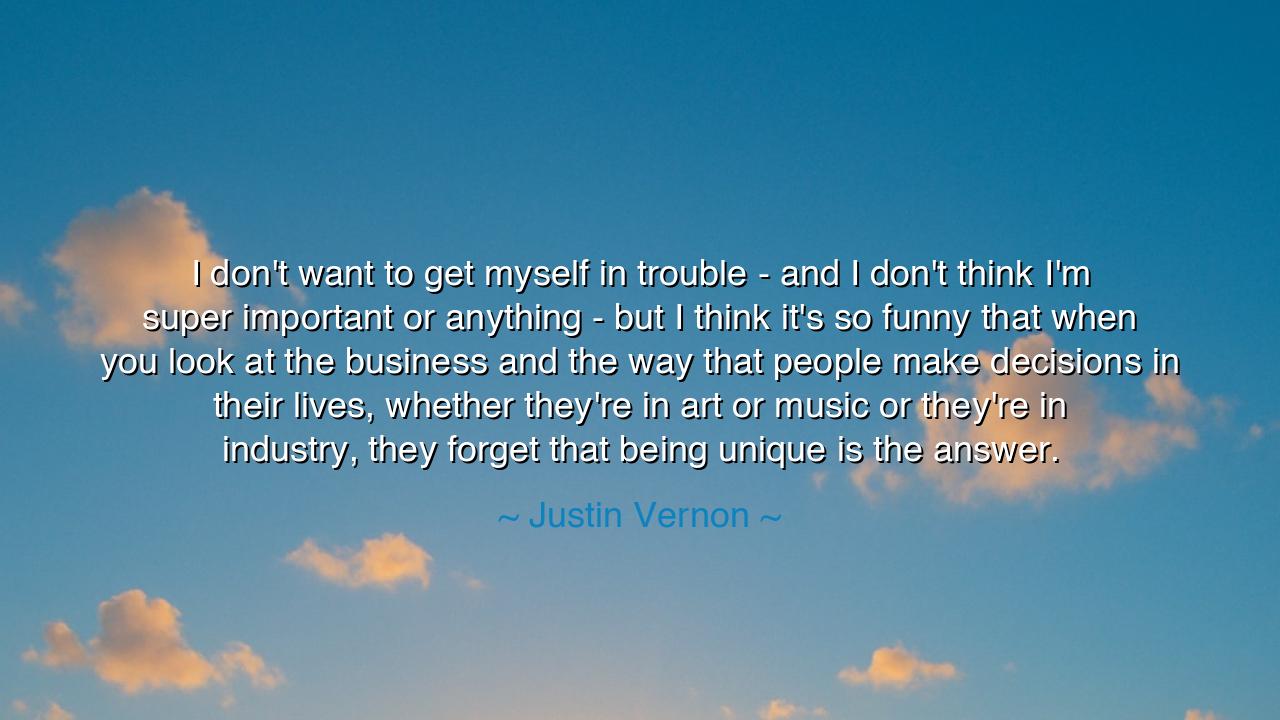
I don't want to get myself in trouble - and I don't think I'm
I don't want to get myself in trouble - and I don't think I'm super important or anything - but I think it's so funny that when you look at the business and the way that people make decisions in their lives, whether they're in art or music or they're in industry, they forget that being unique is the answer.






The musician and poet Justin Vernon, whose voice carries both solitude and strength, once said: “I don't want to get myself in trouble — and I don't think I'm super important or anything — but I think it's so funny that when you look at the business and the way that people make decisions in their lives, whether they're in art or music or they're in industry, they forget that being unique is the answer.” At first glance, his words may sound humble, even casual. But beneath their modest tone lies a revelation — a truth both ancient and enduring: that authenticity is the wellspring of greatness, and that the world, in its haste for acceptance, too often forgets the quiet power of the unique.
When Vernon says it is “funny,” it is the bittersweet humor of a man who sees the paradox of modern life — that in an age where individuality is worshiped in name, conformity rules in practice. Artists chase trends; businesses mirror each other; even the dreamers fear standing alone. He laughs not because it is trivial, but because it is tragic — that so many seek success by imitation, when true creation is born only from difference. To him, this forgetting is not merely a flaw of the industry, but a forgetting of the soul’s purpose itself: to bring forth something that has never existed before, something that could only come through one’s own being.
The ancients spoke this same truth, though in other words. The philosopher Socrates urged his students to “know thyself,” for only by knowing oneself could one live rightly. To imitate another, he warned, was to live a shadowed life — to betray the divine spark that makes each soul distinct. So too did the poet Homer sing of heroes who rose not by copying others, but by following their destined path, however perilous. Odysseus, tempted by the comfort of imitation, chose instead the path of return — unique, uncertain, his own. He was not the strongest nor the purest, but the truest to himself. And that, as Vernon reminds us, is the path to immortality.
Vernon’s insight also springs from his own story. When he retreated to the cold solitude of Wisconsin to record what would become Bon Iver’s first album, he was not following the world’s advice — he was fleeing it. Sick, heartbroken, and forgotten, he created not for acclaim, but for survival. And from that solitude came originality — a sound that no one else could have made, because it was born of his own honest despair. That is the paradox of uniqueness: it cannot be strategized, it can only be lived. His success came not from seeking it, but from surrendering to his own nature. In his retreat, he rediscovered what so many in art and commerce have lost — that to be different is not to be doomed, but to be free.
The “business” he speaks of is more than the industry of music — it is the business of life itself. Whether one builds songs, machines, or ideas, the temptation is always the same: to imitate what has already been rewarded. People fear failure, so they follow the proven path. But as Vernon observes, in doing so they lose the very thing that could make them extraordinary. The marketplace of the world praises innovation, yet punishes risk. And thus, humanity’s greatest treasures — the untried, the strange, the beautiful — remain hidden in the hearts of those too afraid to let them out.
There is wisdom, too, in Vernon’s humility — his admission that he is “not super important.” For the call to uniqueness is not prideful. It is not saying, “I am better,” but “I am different.” It is the courage to stand as one’s own creation, not as a reflection. To be unique is not to shout louder, but to sing one’s own note, however quiet. It is to trust that truth, no matter how fragile, is stronger than imitation. In this way, Vernon’s laughter becomes a call to awakening — a gentle reminder that the answer has always been within us: the courage to be ourselves.
The lesson, then, is clear: do not seek to belong at the cost of your soul. The world will try to shape you into its likeness, but only by being unique will you find your place within it. Whether in art, work, or life, resist the lure of repetition. Walk your own path, however uncertain. Let your voice quiver if it must, but let it be yours. For the river that follows another’s course may be safe, but it will never carve its own valley.
So, my child, remember Justin Vernon’s quiet wisdom. When you find yourself wondering what path to take, or what the world expects of you, pause — and listen for the sound of your own heart. That is your compass. Follow it. For to live in imitation is to fade unnoticed, but to live in authenticity is to leave behind a melody that no other soul could ever play. And that — as Vernon teaches with laughter and humility — is the truest, oldest answer of all.






AAdministratorAdministrator
Welcome, honored guests. Please leave a comment, we will respond soon